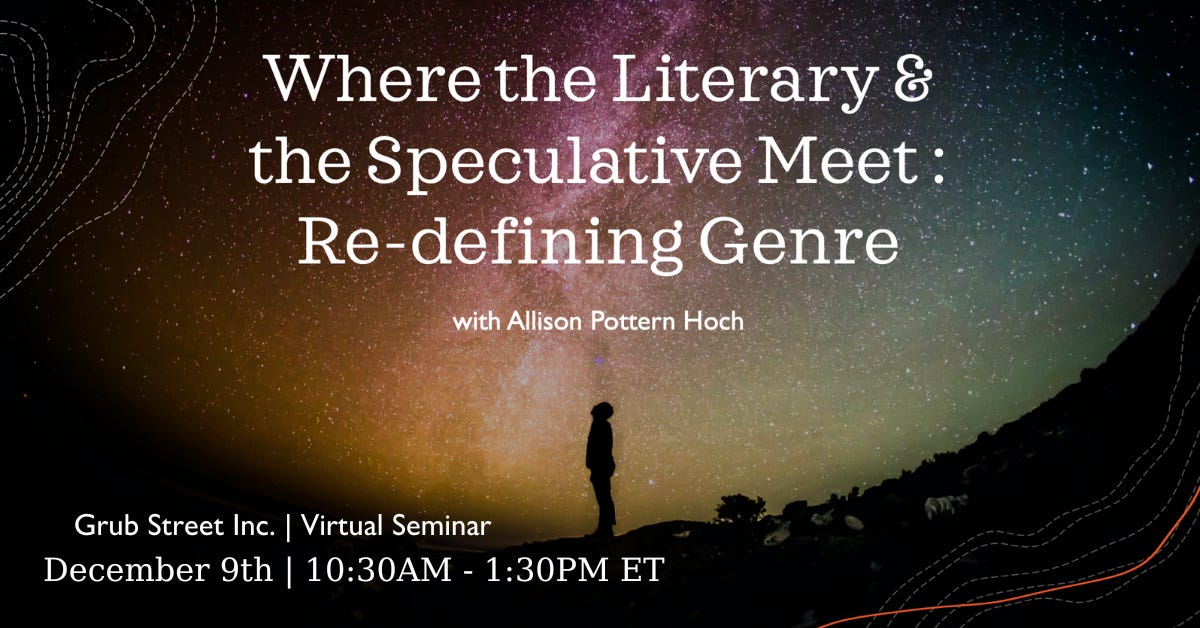Holding Truths + empathy, craft books, and literary controversy
Lovecraft's problematic legacy makes way for meaning; genre workshop; audiobooks; romance beats; wielding empathy; voices in publishing; craft books; national book award controversy; botanical tea
Thanks for your patience, dear readers, I needed a little extra time to write this week’s newsletter. ~A
Greetings readers & writers,
This month I’ve been researching H.P. Lovecraft.
My speculative fiction discussion group decided to do an author study on problematic authors. Lovecraft was a special request. I didn’t know much about the man besides “racism” and “eldritch horrors” and definitely tentacles. His style and mythos — the existential terror of learning one’s insignificance in the face of vast and ancient horrors (and yes, tentacles)— was and remains hugely influential on the horror genre and pop culture, despite the fact that he was practically unknown in his lifetime. He was also a mentor to many young writers and encouraged them to write within the worlds he’d create — yes, he encouraged fan fiction.
But his work (and world-view) is also deeply steeped in racism, anti-semitism, miscegenation, and xenophobia. Not just the occasional slur, but open degradation of anyone who wasn’t white or able to assimilate. His genre defining mythos was rooted in his own existential terror: the danger of those he perceived as “the Other.”1
Some might argue that means his work is worthless. Others, that the work should be separated from the man’s ideals and stand on its own merit. Or that he was “just a man of his time” and all sins should be forgiven.
Instead, what we discussed in our group is how to sit with both the idea that Lovecraft has had a huge, long-lasting influence and/because his work taps into a deep-seated fear in a white-centered American psyche: of, in fact, not being the center at all.
We can sit with these two ideas, as uncomfortable as they may be, because they can both be true at the same time. We can sit with them when we have context — Lovecraft’s life and influences, his white-supremacist views, the power (and harm) his words have had on popular culture, a modern understanding of race — and can choose (or not) to enter our own personal relationships with that work with that information in mind.
There are many authors who are turning Lovecraft’s mythos inside out — centering women and Black characters — as a way to reclaim his work and influence for those he disparaged. Because the truth is “cancelling” someone like Lovecraft does not cancel his underlying influences or influence. As my co-host said in our discussion this week: “People of color have known about Lovecraft for a long time, this isn’t news to us.” He was a man of his time, yes, but his views are as ancient and timeless as the horrifying, alien gods of his fiction.
I am not trying to redeem Lovecraft by any means. There’s a bigger point I’m trying to make here. Maybe you’ve gotten there with me. Maybe you’re thinking: an old, dead, white, racist writer is a weird analogy for current events. But alongside wrestling with Lovecraft’s problematic legacy this month, I’ve also with been struggling with where the world is right now, how I fit as an American Jew and a writer, and how/if to talk about any of it. For better or worse, preparing this mini literature lesson has clarified some things for me.
An author can have views one finds deplorable and write something that changes the world. A person can generously uplift some while trampling others. A group of people can be defending themselves, while also reigning terror on innocents. Respect and fear, modern shock and deeply-entrenched prejudice, desire for safety and for vengeance, these things can and do co-exist when dealing with difficult situations. I don’t have to like or reward these things for them to still be true. There are no easy answers here because nothing about hatred and history and fear is easy. Trying to reduce complex context into a binary is dangerous and, in my mind, perpetuates the problem: us vs. them, no questions asked.
So what does this mean for writers? I believe we owe extra attention to what we read and write, especially now; that we have a responsibility to contextualize and interrogate these multiple truths so as to challenge both ourselves and our readers. As Salman Rushdie said in a recent interview: “What writers can do — and what they are doing — is to try and articulate the incredible pain that many people are feeling right now and to bring that to the world's attention.”
~
Back at Grub Street

Where the Literary & the Speculative Meet: Re-defining Genre
December 9th | 10:30 AM Eastern | Zoom | Register here
“Fantasy is a tool of the storyteller,” says Neil Gaiman. Whether it’s a touch of time travel or an interstellar war, “speculative” writing is storytelling that breaks the rules of our world. Together we’ll explore definitions and examples of speculative and literary writing and how they overlap; how publishers uses these terms to classify books and authors; and the perils of genre gatekeeping.
Congrats to Jane Cairns , long-ago classmate and fellow Grubbie, who won last month’s free consult! Follow Jane on Threads for updates on her historical fiction novels or check out her retired Substack,
.Remember: you can still get a fun freebie when you refer a friend!
Writing/Marketing Resources
If you’re a Spotify Premium member in the U.S. (or have been considering it), you’re in luck! You now have access to 200,000+ audiobooks through your account. 15 hours of listening are included per month. The whole Expanse series is on there guys!
Trying to plot a romance novel? Author Robin Lovett shares how to plot the character arc for the romance itself in “The Structure of Romance” {DIY MFA}
Something discussed again and again at Viable Paradise was the responsibility writers have to their readers when it comes to a truly immersive narrative. Nicola Griffith writes about this topic beautifully: "Empathy is a powerful tool, and sharp. Be careful how you wield it." {LitHub}
of
hits the nail on the head for me when it comes to talking about the complexities of cancel-culture in her post: Whose Voices Get to be Heard in Publishing? (Thanks to for the link!)Book Marketing Now
Just in time for the holiday season, I’m thrilled to bring you a Book Marketing Now interview later this month with sisters and writing/art duo K. & L. Onley. They are launching pre-orders for their middle-grade novel, Savvy and Mars: The Right Wish to Wish, a story about friendship and the magic of Christmas set in the North Pole.
Reading Corner
When you get a bunch of writers together, they’re gonna want to talk books, especially books about writing. So here’s a crowdsourced list of my Viable Paradise cohort’s favorite inspirational craft and industry books. Many of these I had never heard of before but look so very cool. What’s one of your go-to books on writing and publishing?
Industry News
Wall Street Journal drops its best seller lists {Publisher’s Weekly}
The National Book Awards award ceremony stands out this year as a microcosm of the social issues the literary world is currently grappling with. Levar Burton replaced would-be-host Drew Barrymore after a scabbing controversy during the writer’s strike {Vulture}; two sponsors withdrew earlier this week in anticipation of anti-Israel statements {Shelf Awareness}; and both winners and finalists at the award ceremony took the podium to call for an Israel-Hamas ceasefire. {The Guardian}.
Awards went to Justin Torres for his novel, Blackouts, as well as Ned Blackhawk for his non-fiction work The Rediscovery of America: Native Peoples and the Unmaking of U.S. History, among others.
Judge Will Toss Part of Authors’ AI Copyright Lawsuit {Publisher’s Weekly} “that claims Meta’s Llama AI application infringes their copyrights.”
Scholastic backtracks, saying it will stop separating diverse books for fairs in 2024 {NPR} after controversy around assembling a collection of titles (mainly focused on race, gender and sexuality) to be opt-in only to contend with school book bans. Read We Need Diverse Books’ response to the policy.
Tea
My dear sister made me a care package for Viable Paradise and it included this floral tisane from Flying Bird Botanicals: Dream Catcher Tea. With soothing chamomile and lemon balm, as well as a little rose and lavender, a mug of this tea is like sipping an evening stroll through a botanical garden, in the very best way.
It’s okay to sit with discomfort. It’s also ok to turn off the news and make yourself a cup of tea. Write a poem. Call a friend. And help, if you can, in whatever way sits right with you.
~Allison
Writer & Marketing Coach
Keep Writing, Keep Connecting! Substack | Facebook | Website | BlueSky
Like what you read? Thanks so much for your support! Continue to show the love by hitting that heart button, subscribing, leaving a comment, and/or passing it along!
The Racial Imaginaries of H. P. Lovecraft {Brown University Library}
* Banner image photo by COPPERTIST WU on Unsplash







Thank you!